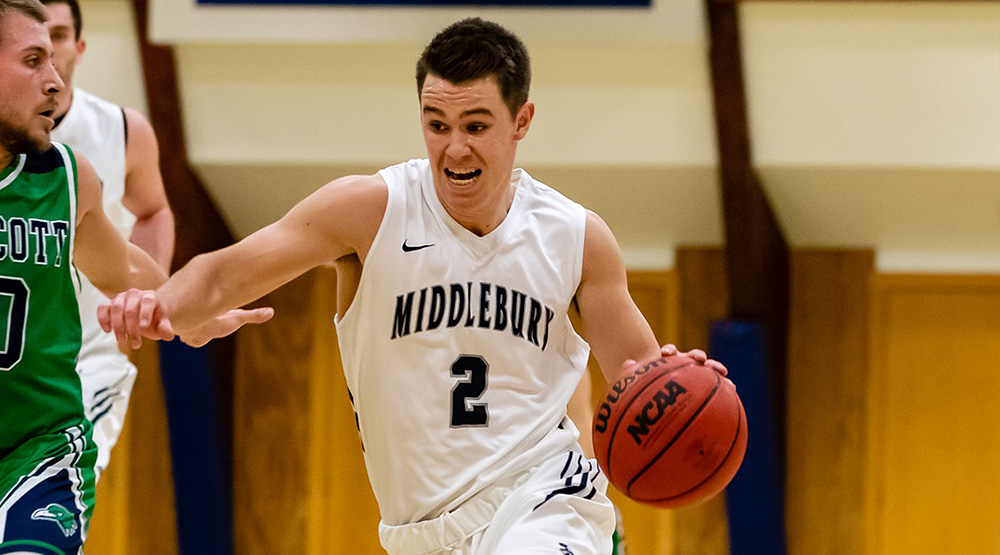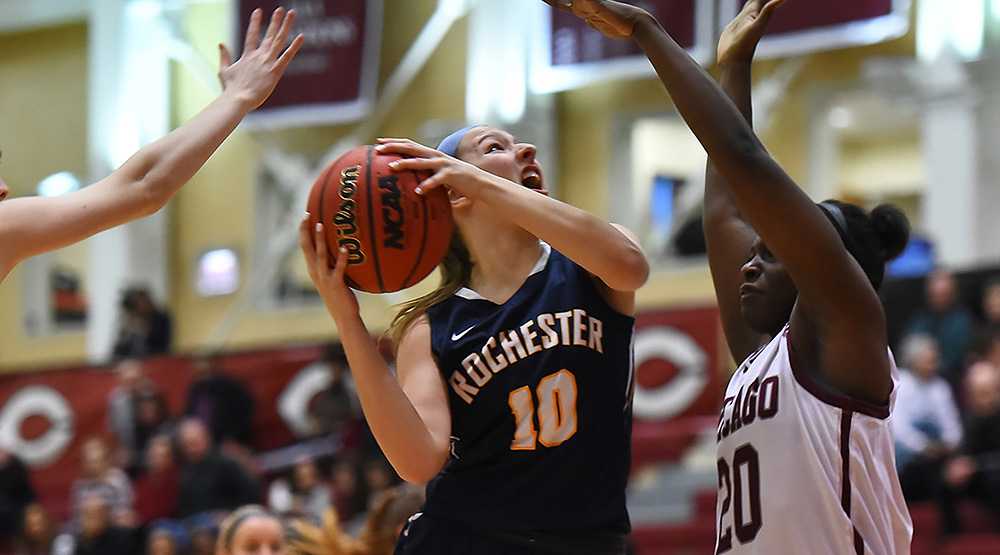
|
| Griffin Kornaker's dad, Rob Kornaker, basically gave up coaching at St. John Fisher to move to Vermont and follow his son's Division III basketball career. Middlebury athletics photo |
By Ryan Scott
D3sports.com
There’s that cliché, about coaches’ kids, that they have a high basketball IQ, know the fundamentals, and probably have a more than decent outside shot. It’s not entirely false, of course, as coaches’ kids do end up with an innate understanding of the game, almost by osmosis.
I think it also instills an important perspective. For many basketball players, achieving the highest level and utmost notoriety is a primary goal. They seek out high-profile programs and work for scholarship money, wherever it may come. As lots of Division III coaches will tell you (and those student athletes), there’s a lot more to a college decision than basketball.
There are a lot of Division III players on their fathers’ teams – Danzigs at Scranton and Raridons at North Central (among others). Although not every coach’s kid gets that opportunity, they do tend to make college choices with the bigger picture in mind.
Jamie Boeheim didn’t have the opportunity to play for her Hall of Fame father (Syracuse men’s head basketball coach Jim), as her brother Buddy is doing. She picked Rochester for a lot of good basketball reasons – the graduated four post players from last season and have always competed at the highest levels of Division III – but she also wanted to play, an opportunity that would be harder to come by on a Division I bench.
Catholic coach Steve Howes recognizes the same choice in freshman Will Turgeon, whose father Mark coaches the men’s team at nearby Maryland. “He has the skills to be a really good walk on at a big program,” says Howes. “But he loves the competition and the chance to be on the court and he’s come to realize just how good the players are at Division III, that a lot of guys at this level could be playing Division I basketball.”

|
| Will Turgeon's father coaches just a few metro stops away, at the University of Maryland. Catholic University athletics photo |
One of the more interesting scenarios is that of Griffin Kornaker, a sophomore guard at Middlebury. His decision wasn’t about playing time, but about future academic pursuits. “When [Griffin] went to prep school,” says Rob Kornaker, Griffin’s father and long-time St. John Fisher head coach. “It opened up a lot of doors academically for him, opportunities that could really change his life.”
The elder Kornaker instructed his assistants to recruit Griffin as they would any other player, but, as a father, he tried to sit back and allow his son to make his own choice. “We looked at MIT,” says Rob. “And the coach said something that really resonated with me, something I’d never thought about at Fisher, but it makes a lot of sense. He said, ‘Everyone talks about the next four years, but we talk about the next 40 years.’ ”
In the end, Griffin’s journey led him to Middlebury, where he’s one of the key guards on a contending NESCAC team. It also led Rob to early retirement, leaving St. John Fisher at the age of 49. “I feel pretty lucky that my wife has a job that allowed me to make this choice. When Griffin went to prep school we missed out on a lot and we didn’t want that to continue.”
“During the season, Rob is a Middlebury resident,” says Panthers coach, Jeff Brown. “He has not missed a game [home or away] in almost two full seasons; I bump into his two or three times a week aside from the games.”
Having a peer staring over your shoulder – literally – every night, might be difficult for some coaches. Not so for Brown. “There’s probably not a better guy, a better person around. He’s one of the best human beings you’ll ever be around,” says Rob Kornaker, “Most coaches are crazy and intense – I was that way – but Jeff goes about it in a really special way. I couldn’t ask for a better person to be taking care of my son.”
From Brown’s perspective, Rob is just a great, supportive father. “We haven’t spent a great deal of time talking X’s and O’s, but I do realize I have another great set of ears I can ask questions of,” says Brown, “Rob has been nothing but supportive of our program. We have a really good relationship. We both just want the best for his son.”

|
| Jamie Boeheim averages 13 minutes and 5.6 points per game off the bench for Rochester. Photo by Dean Reid, d3photography.com |
This is the same story at Rochester and Catholic, too. “Jim is a Hall of Fame coach,” says Rochester head coach, Jim Scheible. “I’d listen to anything he has to say, but he also understands you don’t want someone else telling you how to coach your team. He’s more interested in being a supportive father.”
Turgeon has welcomed Howes to Maryland practices and is generous with his time as a coach, but when it comes to Will, the older Turgeon is just happy being dad. “He’s waiting around outside the locker room after games likes any other parent,” says Howes. “I think it’s a chance for him to be around basketball and not be a coach, which is probably a relief.”
“I’m enjoying this so much,” says Kornaker. “You get to experience everything from a different perspective. I get to be wholly supportive in ways you just can’t when you’re the head coach. When he graduates, I may seek out an assistant position, where you can have relationships with the players without being solely responsible for wins and losses.”
It’s a difficult balancing act for those coaches who do have a child on the roster. Ron Rose is in his fourth year as son Brady’s coach at Illinois Wesleyan. “That first year was not as enjoyable as it should have been because I was worried about whether I was treating him like everybody else; I think he felt the same thing. We sat down before his sophomore year and just said, ‘we’re going to look back on this in ten or twenty years and we need to make this a special time.’ My goal was just that his college experience not be negatively impacted by me being here.”
There’s camaraderie of coaches’ kids. “My own kids have gravitated to Will,” says Howes. “They just instinctively know he understands what it’s like for them to be the child of a coach and to be around this lifestyle.”
There’s also an added pressure from media exposure when there’s a famous name both on the floor and in the stands. “Jim is pretty recognizable, when he’s here,” says Scheible. “But he’s very gracious talking to people and he seems to genuinely appreciate the love he has from the community. In Western New York, though, his wife Julie is just as much a celebrity as he is. She’s very involved and well known and at a lot more games than he is able to make.”
“[Jamie] is very comfortable with [the notoriety],” says Scheible. “She’s obviously been dealing with it her whole life. The family, I think, likes celebrating that everyone is involved in basketball.” Adds Howes: “Will has handled the media coverage with such class and maturity beyond his years – like a four year veteran. It’s really cool to watch a young man rise to the occasion like that.”